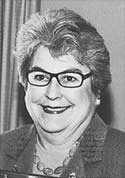
|

Threat to African-Americans
|
••••••••••••••••••••••••
|
|
"[Assisted Outpatient
Treatment] torpedoes constitutional rights. The person either chooses to be sent
to a mental institution for the criminally insane or agrees to take mind-altering
psychiatric drugs that are nothing more than chemical straightjackets."
- Cassandra Auerbach, Executive Director, Citizens Commission on Human Rights,
LA Chapter.
|
|
••••••••••••••••••••••••
|
Prominent African-American community leaders in Los Angeles are closely monitoring the California law's threat to civil liberties. They are aware of the disproportionate application to the black community of an almost identical law in New York, which they are closely tracking. Under the New York Law, implemented in 2001, 40% of those forced into AOT are black. Yet African Americans made up only 24.7% of the total mental health client population of New York State.
According to Rev. Fred Shaw, President of the NAACP of Compton, the possibility that a similar scenario could occur in Los Angeles is "stronger than anyone realizes."
Says Rev. Shaw, "Mark my words: this can easily turn into a steamroller to the civil rights of African-Americans. It seems to me there are way too many loose definitions of 'mental disease' that get thrown about, which could all too easily be applied to minorities."
Current LA Mental Health Department statistics give credence to Shaw's concerns. African-Americans make up a disproportionately higher percentage of the mental health system population, compared to general LA County demographics. According to the U.S. Census, African-Americans comprised 9.8% of the population of Los Angeles County in the year 2000. Yet the percentage of African Americans in the mental health client population was 18.4% of mental health population in 199798, the latest year for which figures are available.
Thompson's Treachery
Smoke-and-mirrors report
|

Helen Thompson: Don't judge her report by its cover.
|
California State Assembly Member Helen Thomson, a former psychiatric nurse, introduced the state's new forced drugging law — her third such attempt to push Assisted Outpatient Treatment (AOT) through the legislature. The previous year, she failed to gain consensus of the Joint Committee on Mental Health Reform (JCMHR), so she then issued her own report, masquerading it as an “official” issue from the Joint Committee. Her paper's only significance was that it was a public statement issued by an individual Assembly Member.
In her report she added a 14th point to the Joint Committee's original 13, which did recommend the AOT program — in the JCMHR's name: “the JCMHR recommends that the legislature support funding to establish assisted outpatient treatment programs for involuntary patients....”
Her claim of “official” consensus by the JCMHR was, in fact, a minority report supported by just a handful of committee members who sided with her on AOT.
|
The table for the expenditures by race for 199798 shows mental health
subsidies for African-Americans at 22.43% of the total or $48,454,360 out of the
whopping $215,976,840 subsidy for Los Angeles County. Some community leaders fear
that if more expensive in-patient services are in the offing, disproportionate
usage rates for mental health services to blacks could soar far higher.
Reverend Leonard Jackson of the Los Angeles First African Methodist Episcopal
Church agrees with Shaw's assessment of the problem. "The history of the political
use of forced psychiatric drugging shows further cause for concern," he said.
"All one has to do is look up its history in Russia where it was used to curb
dissent and silence political opposition. Psychiatric detention and forced drugging
is currently used in China against dissidents and religious minorities. This looks
to me like a similar pattern developing here in LA."
Opponents of AOT feel the possibilities for its abuse are endless, not just
for African-Americans, but anyone. "Criteria for commitment are vague and subjective,
so it becomes a net that can catch many people," says Sally Zinman, Executive
Director of the California Network of Mental Health Clients, which is suing the
County of Los Angeles over its implementation of AB 1421. "The new law allows
[an AOT] hearing to proceed without the person being there.... Los Angeles County
sets a bad precedent for other counties to follow."
Draconian Diagnoses
"Psychiatrists, by their own admission, are unable to define 'mental illness,'"
says CCHR's Auerbach. "As such, they are virtually worthless in diagnosing it.
Yet that is how the trials and tribulations of normal, day-to-day living can suddenly
become the excuse for randomly committing someone to a mental hospital."
Nicole McNeil can attest. "I know how easy it is to be misdiagnosed and labeled
with a mental disorder, and now that I have this label, my only recourse is to
use the judicial system to correct it," she says.
"It feels like I'm on probation — but I never committed a crime. Since this
happened to me, I have been on a quest to clear my name. It took only a few minutes
for family members — with their own criminal record and a history of drug abuse
-- to exploit this system for personal gain by using a psychiatrist to diagnose
me as mentally ill without ever legitimately examining me."
Her conclusion: "If this could happen to me, it could happen to anyone."
|

|


